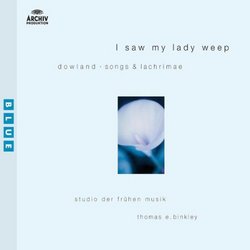| All Artists: John Dowland, Studio der frühen Musik, Andrea von Ramm, Nigel Rogers Title: I Saw My Lady Weep: Dowland's Songs and Lachrimae Members Wishing: 0 Total Copies: 0 Label: Archiv Produktion Release Date: 10/8/2002 Genres: Pop, Classical Styles: Vocal Pop, Opera & Classical Vocal, Chamber Music Number of Discs: 1 SwapaCD Credits: 1 UPC: 028947172123 |
Search - John Dowland, Studio der frühen Musik, Andrea von Ramm :: I Saw My Lady Weep: Dowland's Songs and Lachrimae
 | John Dowland, Studio der frühen Musik, Andrea von Ramm I Saw My Lady Weep: Dowland's Songs and Lachrimae Genres: Pop, Classical
|
Larger Image |
CD Details |
CD ReviewsOne of Thomas Binkley's Rare Excursions into the 17th Centur Leslie Richford | Selsingen, Lower Saxony | 03/09/2008 (4 out of 5 stars) "John Dowland (1563 - 1626): I Saw My Lady Weep - Songs and Lachrimae. Performed by: Studio der frühen Musik, Munich [Andrea von Ramm, mezzo-soprano; Grayston Burgess, countertenor; Nigel Rogers, tenor; Karl-Heinz Klein, bass; Sterling Jones, Laurentius Strehl, Kurt Haselhorst, Hans-Peter Winkel and Johannes Finck, violas da gamba; Thomas Binkley, lute], dir. Thomas Binkley. Recording: August and September 1964, Großer Saal [Large Hall] of the Musikhochschule Munich, Germany. First published on LP: 1966. Re-released in 2002 as Dutsche Grammophon Archiv Blue 471 721-2. Total playing time: 54'33".
This recording,now over 40 years old, is one of the few that led the American Thomas E. Binkley (1931 - 1995) and his Munich ensemble beyond the medieval period. His Dowland program was, in its way, pioneering, at least back in 1964, offering a selection of lute songs, viol consorts and polyphonic pieces - although booklet author Larry Palmer is right in declaring "Thou Mighty God" from "A Pilgrims Solace" to be something of a failure here: together, the four singers sound rather "untidy" (including intonation problems), thus making the piece sound a lot more "old-fashioned" than anything else on the CD. The viol consorts, too, have been, in the mean time, better recorded by specialist ensembles such as Fretwork or the Parley of Instruments. Still, the "lachrimae" pieces do offer a pleasant change between the lute songs, performed by Andrea von Ramm, Grayston Burgess and Nigel Rogers (and in which Thomas Binkley himself impresses with his sensitive lute accompaniments). Of the singers, it is the young Nigel Rogers who creates the best impression with his high tenor and his absolutely stylish singing. Countetenor Grayston Burgess also has some splendid moments, but I doubt that his "flute-like" timbre will please every listener. Andrea von Ramm's mezzo-soprano sounds, on the other hand, rather androgynous and takes some getting used to, even for the specialist. Perhaps the greatest praise I can lavish on this CD is to point out the atmosphere of peace and timelessness that it irradiates. Deutsche Grammophon has taken care to digitalize the sound in such a way as to make it practically free of hiss; and the booklet is anything but a cheaply printed addition: It is very well produced and contains all the details of the performers and their instruments, an informative, retrospective essay by Larry Palmer and all the texts of the songs complete with successful German and French translations." |

 Track Listings (12) - Disc #1
Track Listings (12) - Disc #1